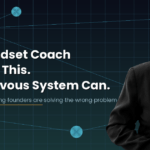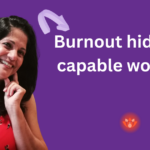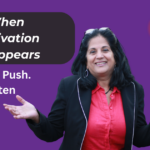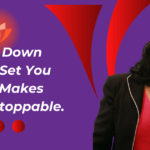We’ve been told two big stories about women and success (female success without burnout). The first says: Hustle harder. Outwork everyone. Grind until you make it. The second says: Hustle is toxic. The cure is balance. Follow science-backed routines, self-care rituals, and wellness hacks, and you’ll thrive.
Both sound empowering. Both are traps.
Because here’s the truth:
👉 Hustle culture drained women by demanding more.
👉 Science culture drains women by demanding perfection.
Neither was built for women. And chasing either one means playing by someone else’s rules. So if hustle and science aren’t the answer, what is? Let’s break it down.
The Myth of Balance: female success without burnout
The mainstream narrative is seductive:
Hustle burns women out.
Balance, boundaries, and wellness are the enlightened alternative.
But balance isn’t freedom. It’s another test. One era measured women by the hours worked.
This era measures women by how perfectly they optimise health, mindfulness, and productivity.
Either way? The ruler isn’t yours.
Power & Control: From Hustle to Science
For the first wave of women breaking into boardrooms, law firms, and hospitals, hustle was leverage: outwork the boys, outlast them, and prove your worth.
Not noble. Not sustainable. But necessary.
Then, the hustle became the villain. And in came the experts:
“Science says wake up at 5 a.m.”
“Science says journaling boosts performance.”
“Science says don’t hustle optimise.”
Sounds different. But is it?
Grinding until midnight was a hustle. Grinding at dawn with perfect sleep scores and green juice? That’s just hustle in a lab coat.
📌 For Example, a Harvard Business Review ran an article called The Science of Resilience. It was marketed as a cure, but read closely. It’s another productivity manual.
👉 Don’t confuse expert validation with empowerment. Sometimes, raw, unapologetic hustle was the only equaliser.
Burnout Isn’t a Feeling, It’s a Tax
People talk about burnout as if it’s just stress or bad boundaries. But that’s too soft. Burnout isn’t just fatigue.
👉 Burnout is a tax.
And like every tax, it doesn’t hit everyone equally.
Executives can “pay” for burnout with therapy, coaches, or spa retreats. They treat it like a deductible expense.
For most women, burnout manifests as hospital bills, lost jobs, or being quietly passed over for promotion.
📊 Consider the numbers:
Women are nearly twice as likely to leave the workforce due to stress-related health issues.
McKinsey found that women in leadership are leaving at the highest rate ever, not because of a lack of talent but because the burnout tax keeps compounding.
Wellness perks? They often go to the privileged. Flexible schedules, coaching, and meditation apps are rarely offered to frontline staff, caretakers, or hourly workers.
Take two women.
One is a VP. She books a Costa Rica retreat when burnout hits. Inconvenient, but manageable.
The other is a nurse who works double shifts while caring for her family at home. She can’t afford a retreat, so she pushes until her health collapses.
Same word: burnout. Completely different tax brackets.
👉 Candles or apps don’t solve female success without burnout. It’s systemic. It’s an unequal tax levied on women and the poorer you are, the higher your rate.
Hidden Hustles: Balance as the New Grind
Here’s the uncomfortable truth: success without hustle is a myth.
At the top, everyone hustles. They just rebrand it.
CEOs brag about their “zen mornings” while their teams cover the chaos.
Wellness influencers post about balance, but their full-time hustle creates that illusion.
Balance itself has become performance work.
And here’s the overlooked insight: hustle didn’t cause burnout. Isolation did.
Earlier women’s movements hustled hard, but they did it together. They held protests, organised, built businesses, and raised families. Collective energy was their shield, and solidarity was their fuel.
👉 The danger isn’t hustle. The threat is hustling alone.
The Gendered Cost: Built on Male Blueprints
Here’s what most people never say: hustle culture and science-backed productivity hacks were designed on male blueprints.
Corporate hustle? Built around male bodies, with fewer reproductive health demands, childcare duties, or menopause transitions.
Scientific productivity studies? Mostly tested on men. Even sleep research, drug trials, and stress tests.
📌 Stanford’s 2019 study found women’s stress patterns diverge sharply from men’s. Yet “stress cures” are still sold universally.
📌 The famous 10,000-step rule? Based on 1960s male office workers in Japan, it has never been validated for women juggling unpaid domestic labour.
👉 That’s the trap. Hustle was toxic because it ignored women’s realities. Science is harmful because it still does.
So maybe the answer isn’t hustle or science. Perhaps it’s building a success model that is not borrowed from men but built for women (female success without burnout)
The Identity Shift: The 3 Cs of Female Success
You don’t need to swap hustle for science. You need to reclaim agency.
Agency means sprinting when you decide. Resting when you choose. And doing it with people who have your back.
Here’s the model I believe in:
Choice → Define your sprints and rests. Not theirs.
Community → Hustle together, never alone. Build solidarity pods.
Context → Tailor strategies to your real life. Don’t borrow playbooks that weren’t built for you.
This isn’t about working less. It’s about working in alignment.
So stop chasing hustle. Stop chasing science.
Start chasing choice. Because the future of female success isn’t less effort.
It’s a smarter, collective, chosen effort for female success without burnout.
💬 Your Turn:
Which of the 3 Cs — Choice, Community, or Context- feels most urgent for you right now? Please share your thoughts below. I’d love to hear how this lands for you.






